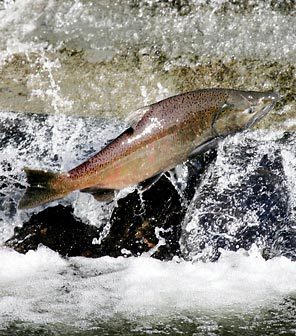forum
library
tutorial
contact

New US-Canada Salmon Agreement Proposed
by Associated PressInternational Herald Tribune, May 23, 2008
|
the film forum library tutorial contact |

|
New US-Canada Salmon Agreement Proposed
by Associated PressInternational Herald Tribune, May 23, 2008 |
 OLYMPIA, Washington - The U.S. and Canada have reached a tentative agreement to prevent overfishing of endangered chinook salmon off the western coast of Canada and southeast Alaska, state officials said Thursday.
OLYMPIA, Washington - The U.S. and Canada have reached a tentative agreement to prevent overfishing of endangered chinook salmon off the western coast of Canada and southeast Alaska, state officials said Thursday.
The new 10-year agreement, a revision of the existing Pacific Salmon Treaty, was announced Thursday afternoon by the Pacific Salmon Commission. It needs to be approved by federal officials and the Canadian government.
The agreement would most affect Chinook salmon, whose numbers have declined significantly, even drastically, this year off the West Coast, prompting calls for a federal disaster declaration to aid coastal communities dependent on fishing.
While the new agreement does not address the coastal salmon fishery collapse, officials said that the return of salmon from the north will help with the fisheries problems that Washington and Oregon are having.
Under the proposed treaty change, Alaska will reduce its catch of wild salmon 15 percent over the next 10 years; Canada will make a 30 percent reduction under the plan. The U.S. would give Canada $30 million for its effort to reduce commercial salmon fishing. Alaska would receive about $7 million. Washington state would receive about $7 million in federal money to improve Chinook habitat.
The allocated funds would need congressional approval.
David Bedford, Alaska's representative on the salmon commission, said in a statement that the catch reduction "is a tough position for us to accept."
"While we had to make some sacrifices to reach this agreement, we were convinced that this is a responsible agreement that provides stability for our fisheries and helps ensure the long-term health and sustainability of shared salmon resources," he said.
Paul Macgillivray, associate regional director general for the Pacific Region Canadian Department of Fisheries and Oceans, said that while Canada does have to reduce a large portion of its harvest, it benefits from the Alaskan reduction.
He said that the final agreement was a "balanced approach where both countries made reductions in response to conservation concerns that were brought to the table."
Macgillivray said participants have until the end of the year to get both governments to sign off on the agreement.
The 1985 treaty was written to prevent the overfishing of Pacific salmon and to determine how the harvests should be divided among Alaska, Oregon, Washington and Canada. The agreement covers portions that were up for renewal at the end of this year.
Officials believe the deal could allow about 1 million more Chinook to return to hatcheries or spawning areas in Puget Sound and the Columbia River, instead of being caught by sport or commercial fishermen off Alaska and Canada. It also addresses coho, chum and pink and sockeye salmon.
"This could not have happened had we not come with a common goal and a collaborative approach," Gov. Chris Gregoire told The Associated Press. "We now have a fighting chance to save the salmon."
On May 1, federal authorities declared the West Coast ocean salmon fishery a failure, opening the way for Congress to appropriate economic disaster assistance.
The declaration stemmed from the sudden collapse of the Chinook salmon run in California's Sacramento River, where the salmon return to spawn. Scientists haven't figured out the cause; possible factors include habitat destruction, dam operations and agricultural pollution.
Washington state has seen severe declines as well, said Jeff Koenings, director of the Washington Department of Fish and Wildlife and chair of the Pacific Salmon Commission.
"The fish are just not materializing and we don't know why," he said.
The fishing arrangements under the 1985 treaty between the U.S. and Canada were up for renewal at the end of this year, and the new agreement covers U.S. and Canadian management plans from 2009-2018. In two years, the Pacific Salmon Commission will renegotiate fishing arrangements for the Fraser River system in Canada.
The treaty was written to prevent the overfishing of Pacific salmon and to determine how the harvests should be divided among Alaska, Oregon, Washington and Canada.
The new agreement covers fish returning to Washington and Oregon, and covers both Columbia River and Puget Sound stocks.
learn more on topics covered in the film
see the video
read the script
learn the songs
discussion forum
